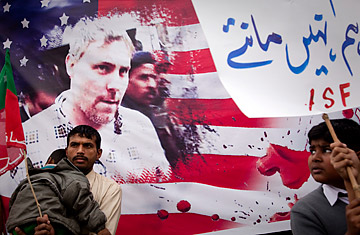
Protesters stand next to a banner bearing an image of U.S. consulate employee Raymond Davis, who shot dead two local men in Lahore, Pakistan, on Feb. 3, 2011
(3 of 3)
An indication of the extent of the breakdown between the ISI and the CIA station chiefs came in the weeks after the bin Laden raid, when the U.S. official's name was leaked to the local press. That marked the second time in five months a CIA station chief's cover had been compromised. The previous Islamabad station chief had been forced to leave in December after his identity was revealed in a legal action brought by a relative of victims of a drone strike. U.S. officials believe that leak came from the ISI in retaliation for Pasha's name being included in a New York City lawsuit brought by relatives of victims of the 2008 Mumbai massacre.
The drone program, targeting militants along the Pakistani-Afghan border and initially launched with the cooperation of the ISI, has become a major source of tension in the CIA-ISI relationship. A senior Pakistani military official tells TIME the ISI stopped collaborating with the CIA in drone strikes in mid-2008. Since then, the CIA has intensified the rate of drone strikes to nearly one every four days. Both sides say the attacks have become more accurate in that time. Pakistani officials confirm reports that the ISI receives only "concurrent notification" of the strikes: it is informed of the targets after the missiles have been fired. Pakistani officials complain that drone strikes, widely reviled among the Pakistani public, often target mere foot soldiers, although they concede that the drones have helped cut down key targets and limit militants' freedom of movement.
The ISI now demands that the drone programs either are halted or are continued but only with full Pakistani participation. There appeared to be a rare pause in recent weeks, with Monday's drone strike in South Waziristan being the first known since July 12 — the lengthiest hiatus since the height of the Davis affair, when no drones were fired for 28 days from January to February.
The centrality of the spy agencies to the pursuit of al-Qaeda and also to the shaping of an Afghanistan endgame makes the conflict between the CIA and the ISI a major factor in the U.S.-Pakistani relationship. As one U.S. official tells TIME, "It is bleeding over into other areas of cooperation." Pakistan's official position is that it is reviewing the terms of its entire relationship with the U.S. in all areas of cooperation. Pakistan's new Foreign Minister, Hina Rabbani Khar, recently told state television, "The terms of engagement are being revisited, and are being revisited in a way which is creating some problems, some operational issues."
— With reporting by Massimo Calabresi / Washington
